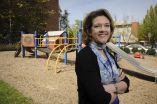Clipping proteins that package genes may limit abnormal cell growth in tumors
2014-11-21
(Press-News.org) Changes to the structure of the protein histone H3.3 may play a key role in silencing genes that regulate cancer cell growth, according to a study led by researchers from the Icahn School of Medicine at Mount Sinai and published online this month in the journal Nature Communications. According to the authors, this is the first study to identify this protein as a key regulator in cellular senescence, a process in which cells stop multiplying.
Cellular senescence has garnered significant scientific interest of late because it may be one key to prevent the initiation of cancer. However, little is known about this process and how genes that enable cells to divide and multiply (the cell cycle) are turned off. A growing body of evidence suggests that the process of cellular senescence is driven by changes in the protein complexes called chromatin in the nuclei of cells.
Using models of senescence, researchers found that histone variant H3.3, a protein that works closely with chromatin to package and regulate genetic material within cells, and in particular its clipped form, help to silence target genes that regulate the cell cycle.
Could the presence of this protein stop cells from dividing? Indeed using genome-wide transcriptional profiling, the researchers revealed that expression of clipped H3.3 silences genes that regulate the division and duplication of a cell.
"Cellular senescence creates a chromatin environment that represses cell multiplication, and thus cell or tumor growth, but how this happens molecularly is what we sought to discover," said lead investigator Emily Bernstein, PhD, Department of Oncological Sciences, Icahn School of Medicine at Mount Sinai. "What we found was that histone H3.3 and its clipped form, which lacks 21 amino acids of the histone tail and associated modifications, prevents normal cells from dividing. Clipped H3.3 may be a marker of cells that stop proliferating and has implications for cancer, in particular cancers like melanoma that have a senescence phase."
INFORMATION:
This research was supported by a grant from the National Cancer Institute, University of Cambridge, Cancer Research UK, Hutchinson Whampoa and the Human Frontier Science Program, funds from The Ellison Medical Foundation, and a Developmental Research Pilot Project Program at Mount Sinai.
About the Tisch Cancer Institute
The Tisch Cancer Institute (TCI) is a world-class translational cancer institute established in December 2007. TCI has recruited more than 30 acclaimed physicians and researchers specializing in basic research, clinical research, and population science; built outstanding programs in solid tumor oncology; enhanced existing robust programs in hematological malignancies; and advanced the study of cancer immunology and vaccine therapy. The completion of the Leon and Norma Hess Center for Science and Medicine in 2012 is enabling the recruitment of up to 20 additional cancer researchers on two full research floors, with 48,000 square feet of space dedicated to cancer research.
To learn more about clinical trials at Mount Sinai, visit http://icahn.mssm.edu/research/clinical-trials.
About the Mount Sinai Health System
The Mount Sinai Health System is an integrated health system committed to providing distinguished care, conducting transformative research, and advancing biomedical education. Structured around seven member hospital campuses and a single medical school, the Health System has an extensive ambulatory network and a range of inpatient and outpatient services--from community-based facilities to tertiary and quaternary care.
The System includes approximately 6,600 primary and specialty care physicians, 12-minority-owned free-standing ambulatory surgery centers, over 45 ambulatory practices throughout the five boroughs of New York City, Westchester, and Long Island, as well as 31 affiliated community health centers. Physicians are affiliated with the Icahn School of Medicine at Mount Sinai, which is ranked among the top 20 medical schools both in National Institutes of Health funding and by U.S. News & World Report.
For more information, visit http://www.mountsinai.org, or find Mount Sinai on Facebook, Twitter and YouTube.
ELSE PRESS RELEASES FROM THIS DATE:
2014-11-21
COLUMBUS, Ohio - Doubling or even nearly tripling saturated fat in the diet does not drive up total levels of saturated fat in the blood, according to a controlled diet study.
However, increasing levels of carbohydrates in the diet during the study promoted a steady increase in the blood of a fatty acid linked to an elevated risk for diabetes and heart disease.
The finding "challenges the conventional wisdom that has demonized saturated fat and extends our knowledge of why dietary saturated fat doesn't correlate with disease," said senior author Jeff Volek, a professor ...
2014-11-21
CHAMPAIGN, Ill. -- Women with symptoms of serious mental illness are significantly less likely to receive three routine cancer screenings - Pap tests, mammograms and clinical breast exams - than women in the general population, despite being at elevated risk for medical comorbidities and early death, a new study indicates.
Women who reported symptoms of serious psychological distress - such as feelings of hopelessness and depression - during the past 30 days were 41 percent less likely to have received Pap tests during the preceding two-year period, University of Illinois ...
2014-11-21
Research published today found that the investigational drug patiromer decreased high potassium levels and maintained normal potassium levels in patients with chronic kidney disease. The results of a multicenter trial appear in the New England Journal of Medicine.
Elevated potassium, a condition called hyperkalemia, increases the risk of death in high-risk patients and limits the use of several types of drugs, called RAAS (renin-angiotensin-aldosterone system) inhibitors, commonly used to control hypertension and cardiovascular disease and prevent kidney disorders.
"Patients ...
2014-11-21
The exclusive club of explorers who have discovered a rare new species of life isn't restricted to globetrotters traveling to remote locations like the Amazon rainforests, Madagascar or the woodlands of the Congo River basin. Just ask professor John Nelson and alumnus Douglas Rayner -- they're having their membership cards stamped with a long-hidden plant found nowhere but South Carolina.
The new species, dubbed Stachys caroliniana, makes its debut on the international botanical stage next week with a peer-reviewed publication describing its unique characteristics. It ...
2014-11-21
A study by a Wayne State University and Children's Hospital of Michigan, Detroit Medical Center research team is shedding new light on the troubling question of whether the drugs often given to HIV-positive pregnant women can cause significant long-term heart problems for the non-HIV-infected babies they carry.
The study recently published in the journal AIDS shows that while the HIV medications have been successful in helping to prevent the transmission of the virus from mother to infant, they are associated with persistently impaired development of heart muscle and ...
2014-11-21
An intervention that uses music and games to help preschoolers learn self-regulation skills is helping prepare at-risk children for kindergarten, a new study from Oregon State University shows.
Self-regulation skills - the skills that help children pay attention, follow directions, stay on task and persist through difficulty - are critical to a child's success in kindergarten and beyond, said OSU's Megan McClelland, a nationally recognized expert in child development and a co-author of the new study.
"Most children do just fine in the transition to kindergarten, but ...
2014-11-21
We are all familiar with the hassles that accompany air travel. We shuffle through long lines, remove our shoes, and carry liquids in regulation-sized tubes. And even after all the effort, we still wonder if these procedures are making us any safer. Now a new type of security detection that uses terahertz radiation is looking to prove its promise. Able to detect explosives, chemical agents, and dangerous biological substances from safe distances, devices using terahertz waves could make public spaces more secure than ever.
But current terahertz sources are large, multi-component ...
2014-11-21
You're at a slumber party with your friends. One friend asks "if a guy at school asked you out, but you weren't really attracted to him, would you go?" You laugh and shake your head no: "Why would I, if he's not my type?"
Or imagine you're at school, sitting in the cafeteria. A guy who you think is attractive but who has some unsuitable personality traits comes up and asks you out. You say yes, even though what you really meant to say was no. "Why did I do that?" you wonder.
According to new research from the University of Toronto and Yale University, rejecting unsuitable ...
2014-11-21
As an actress, producer, director and theatre arts lecturer at The University of Texas at Arlington, Julienne Greer knows the techniques that help draw people's deepest emotions to the surface. Now, she's building on her experience and research to help scientists and robotics engineers better understand the human experience so that they can build more responsive robots.
Greer, who holds a master's degree in media arts and a doctorate in humanities, recently authored the paper, "Building emotional authenticity between humans and robots." In it, she referenced a robot named ...
2014-11-21
OAKLAND, Calif., Nov. 21, 2014 -- Digoxin, a drug commonly used to treat heart conditions, was associated with a 71 percent higher risk of death and a 63 percent higher risk of hospitalization among adults with diagnosed atrial fibrillation and no evidence of heart failure, according to a Kaiser Permanente study that appears in the current online issue of Circulation: Arrhythmia and Electrophysiology.
Digoxin is a drug derived from digitalis, which has been used for more than a century for heart-rate control in patients with atrial fibrillation, and it remains commonly ...
LAST 30 PRESS RELEASES:
[Press-News.org] Clipping proteins that package genes may limit abnormal cell growth in tumors



